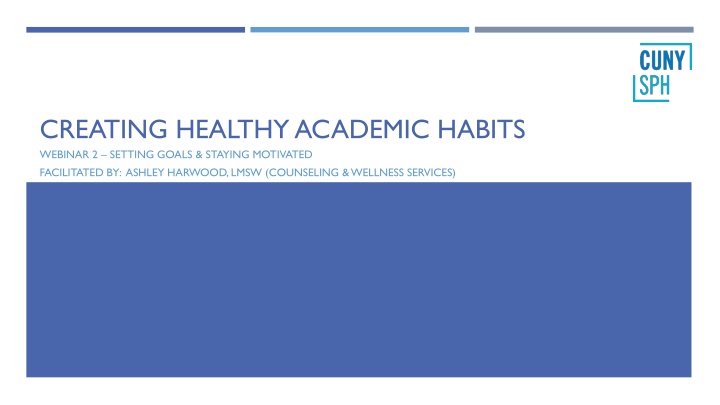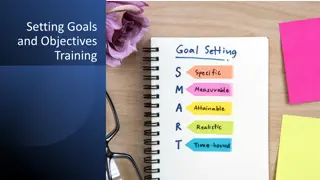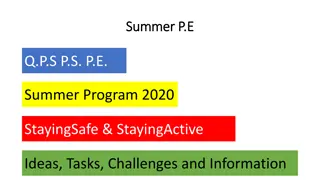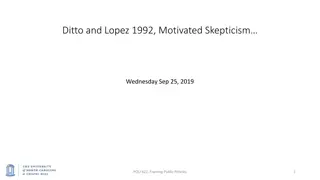Effective Tips for Staying Motivated and Setting Achievable Goals
Facilitated by Ashley Harwood, LMSW, this webinar focuses on developing healthy academic habits like time management, goal setting, self-care, mindfulness, stress reduction, combating perfectionism, and building positive self-talk. Learn how to stay motivated by setting specific, achievable goals, integrating them into your routine, breaking down tasks, acknowledging wins, utilizing rewards, and staying on track. Discover strategies to regain motivation when faced with setbacks, such as taking breaks, seeking inspiration, and seeking social and emotional support.
Download Presentation

Please find below an Image/Link to download the presentation.
The content on the website is provided AS IS for your information and personal use only. It may not be sold, licensed, or shared on other websites without obtaining consent from the author.If you encounter any issues during the download, it is possible that the publisher has removed the file from their server.
You are allowed to download the files provided on this website for personal or commercial use, subject to the condition that they are used lawfully. All files are the property of their respective owners.
The content on the website is provided AS IS for your information and personal use only. It may not be sold, licensed, or shared on other websites without obtaining consent from the author.
E N D
Presentation Transcript
CREATING HEALTHY ACADEMIC HABITS WEBINAR 2 SETTING GOALS & STAYING MOTIVATED FACILITATED BY: ASHLEY HARWOOD, LMSW (COUNSELING & WELLNESS SERVICES)
HABITS THAT WELL COVER IN THIS WEBINAR SERIES: Time Management Goal Setting (This week!) Self Care Mindfulness Stress Reduction Combating Perfectionism Building Positive Self Talk
HABIT 1: STAY MOTIVATED Quote Motivation is what sets you in motion; habit is what keeps you going - Jim Ryun Motivation (and the ability to maintain it) is the driving force of academic achievement. *Adapted from https://www.gradschoolcenter.com/key-habits-successful-graduate-students/
HOW TO GET MOTIVATED? Set one specific, achievable goal Integrate your goal into your day-to-day life make it routine, not obligation, then set a timeframe to it Break down large goals into digestible micro-goals and easy tasks overwhelming tasks can become manageable if broken down properly Acknowledge your wins some do this with a To-Do list where they check off accomplished tasks Use the Reward System Stay on track create reminders, documentations, or day planners of your goals Pay attention to the details that matter some things are not worth sweating over List the benefits of your chosen goal when in doubt, remind yourself of the benefits of your goal Continue to set new goals for continued progress! *Adapted from https://www.gradschoolcenter.com/key-habits-successful-graduate-students/
WHAT IF I LOSE MOTIVATION? Setbacks are pretty normal, especially if you are feeling stagnant and unproductive. Here are tips to help you find your motivation again: Take a break and start fresh.Taking regular breaks can prevent study fatigue and burnout. These rests will allow you to replenish your mind, improve ingenuity, keep your attention in line, and regain your motivation. Quick hack: get out in nature for a short walk for fresh air and sun. Be inspired by others.Feel motivated by reading books, watching motivational shows or videos, and talking with your mentors or friends or family that you look up to. Seek social and emotional support.Open up to your family and friends about your struggles and plans, seek support through counseling services or utilize other SPH resources. Be with positive people. Being surrounded by positive colleagues, friends and family can boost your positive self-talk. Look for support groups with the same interest and endeavors as you. *Adapted from https://www.gradschoolcenter.com/key-habits-successful-graduate-students/
HABIT 2: SET GOALS WHAT TO KEEP IN MIND Know what you re working towards Set goals focused on positivity, realism and objectives Implement a positive mindset (example) Incorrect: I won t be late for class anymore Correct: I will make it on time for all my classes Incorrect: I won t fail my philosophy class Correct: I will get an A in my philosophy class Be realistic (set a SMART goal examples next slides) Set objectives (examples next slides) Objectives should be seen as steps and tools you can use and take to reach your goals. Setting objectives makes your overall goal seem less daunting and more achievable. Rather than focusing on the overall goal, you can set your sights on smaller, less intimidating feats. *Adapted from https://selffa.com/academic-goals/
HABIT 2: SET GOALS SET S.M.A.R.T. GOALS
HABIT 2: SET GOALS SET S.M.A.R.T. GOALS S = Specific Broad-based goals don t help anyone achieve much. Sure, you could make yourself a goal of getting up earlier, but what does that mean, exactly? The goal is so unspecific that you can bend and flex it to fit your needs, rather than using the goal to better yourself. And so, if you typically get up at 9 am every morning and decide you want to get up earlier, you could technically justify to yourself that 8:45 am is earlier. However, if you set the specific goal of getting up at 7:30 am every morning, not only will you achieve greater discipline, but you ll probably get a lot more done in your day. When setting specific goals, remember to define the who, what, where, why, and how of the goal. These specifics will help you attain your goal with more efficiency. Take the waking up earlier example: Incorrect: I want to wake up earlier. Correct: I want to set the alarm to wake up at 7:30 am every morning, so I can get extra work done, freeing up more time for sleep and extracurricular activities as well as improving my grades. *Adapted from https://selffa.com/academic-goals/
HABIT 2: SET GOALS SET S.M.A.R.T. GOALS M = Measurable If you wish to track your progress and most people do your goals should be measurable. Rather than throwing a blanket statement out there of wanting to raise your grades, you should set a measurable goal. Ask yourself how much, how many, and how you ll know when it s accomplished. Otherwise, your goal is some outlandish dream floating around that doesn t really have an endpoint. If you want to improve your grades, set a letter goal. Perhaps you re currently at a C in a certain class, and you want to be at a B. That s a measurable goal. *Adapted from https://selffa.com/academic-goals/
HABIT 2: SET GOALS SET S.M.A.R.T. GOALS A = Achievable Part of being realistic is making sure it s actually possible to achieve your goal. Before you set a goal for yourself, ask yourself two questions: How can I accomplish this goal? What constraints would make this goal unachievable? (i.e., finances, time) Perhaps you like to make weekly goals for your academics. You take a look at your workload for the week to find that you have several papers due and a few exams to study for by Friday. To say that you ll finish it all by Monday night, thus freeing up your week, is probably not very achievable. Instead, set realistic goals that let you achieve everything on time and with quality work. Make yourself a schedule, prioritizing in a way that lets you achieve your goals. *Adapted from https://selffa.com/academic-goals/
HABIT 2: SET GOALS SET S.M.A.R.T. GOALS R = Relevant Your goals should matter to you and your life. Don t set goals just for the sake of accomplishing something; do it for the betterment of your academic career. Ask yourself if the goal you re thinking about is worthwhile. Is now the right time to do this? *Adapted from https://selffa.com/academic-goals/
HABIT 2: SET GOALS SET S.M.A.R.T. GOALS T = Time-bound A timeline is what will help you actually achieve your goals. Goals without a deadline kind of just float there with no real beginning or end. Plan out a specific timeline for your goals, defining where you want to be at certain points. Depending on your goals, you can lay out what you can get done today, what you want to have done in a few weeks, and where you want to be in a few months. You can also determine your end date. Time is especially important for short-term goals, like planning out your final capstone presentation. You have a presentation date, so plan mini goals from now until that day. *Adapted from https://selffa.com/academic-goals/
HABIT 3: SET OBJECTIVES Example it s one thing to say that you want to get an A in a class everyone wants to get A s. Setting smaller objectives will help you get there. Take it one assignment at a time and set objectives for projects. It will be much easier to focus on getting A s on your exams than on the whole semester, and every A assignment gets your closer to that final A. *Adapted from https://selffa.com/academic-goals/
SMART GOAL EXAMPLE 1 *Adapted from https://helpfulprofessor.com/smart-goals-examples-for-students/
SMART GOAL EXAMPLE 2 *Adapted from https://helpfulprofessor.com/smart-goals-examples-for-students/
SMART GOAL EXAMPLE 3 *Adapted from https://helpfulprofessor.com/smart-goals-examples-for-students/
SMART GOAL EXAMPLE 4 *Adapted from https://helpfulprofessor.com/smart-goals-examples-for-students/
REMINDER TO: UTILIZE CUNY SPH RESOURCES TUTORING, CAREER SERVICES & COUNSELING For writing assistance: One-on-one writing tutoring offered on Tues/Wed/Thurs (book online) Drop in office hours (over Zoom) on Wed 4-5PM (link on website) https://sph.cuny.edu/academics/academic-resources/writing-assistance/ For quantitative tutoring: Tutoring offered on Tues/Wed/Thurs (book online) https://sph.cuny.edu/academics/academic-resources/quantitative-tutoring/ Career Services: https://sph.cuny.edu/students/student-services/career-services/ Counseling & Wellness: https://sph.cuny.edu/students/student-services/student-wellness/counseling-and-wellness-services/
REMINDER TO: PRACTICE POSITIVE AFFIRMATIONS I can learn anything I set my mind to I have the courage to try new things I stay calm and in control of myself I am proud of myself for all that I accomplish I am getting better and smarter every day I can solve any problem I will do my best today























